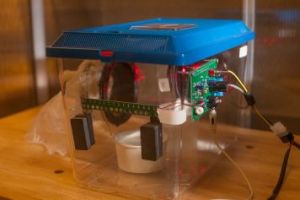Nov 22 2013
The University of California, Riverside announced today that it is a Grand Challenges Explorations winner, an initiative funded by the Bill & Melinda Gates Foundation. Yanping Chen will pursue an innovative global health and development research project, titled “Using Sensors to Understand Insect-Vectored Diseases and Plan Effective Interventions.”
 A container used to store and monitor insects. Photo credit: Peter Phun
A container used to store and monitor insects. Photo credit: Peter Phun
Grand Challenges Explorations (GCE) funds individuals worldwide to explore ideas that can break the mold in how we solve persistent global health and development challenges. Chen’s project is one of more than 80 Grand Challenges Explorations Round 11 grants announced today by the Bill & Melinda Gates Foundation.
To receive funding, Chen and other Grand Challenges Explorations Round 11 winners demonstrated in a two-page online application a bold idea in one of five critical global heath and development topic areas that included development of the next generation condom, agriculture development, and neglected tropical diseases.
Chen, a computer science Ph.D. student working in the lab of Professor Eamonn Keogh in the Bourns College of Engineering, will use the $100,000 to create sensors to count and classify insect vectors, producing real-time information that can be used to plan intervention/suppression programs to combat problems such as malaria. She will be assisted by Adena Why, a Ph.D. student in entomology, and Moses Oben Tataw, who recently earned his Ph.D. under Keogh. The goal is to produce a software system that leverages information from sensors, and can produce real-time counts of the target insects and summarize them in an intuitive and actionable manner.
With sensors already built, the plan now is to further investigate techniques to improve the classification accuracy of the system, to make the sensors more robust and inexpensive, and develop higher level systems and software that will aid health workers and non-governmental organizations. The idea is to create an open-source library of insect wingbeat signatures, circadian rhythms and other behaviors that can be used by researchers worldwide. Already, using a makeshift insectary in Keogh’s computer science lab, the researchers have collected a few hundred thousand observations. In the future, they expect to collect at least tens of millions more. They then plan to do field tests and demonstrations in Cameroon and Cambodia and/or Thailand.
About Grand Challenges Explorations
Grand Challenges Explorations is a US$100 million initiative funded by the Bill & Melinda Gates Foundation. Launched in 2008, over 850 people in more than 50 countries have received Grand Challenges Explorations grants. The grant program is open to anyone from any discipline and from any organization. The initiative uses an agile, accelerated grant-making process with short two-page online applications and no preliminary data required. Initial grants of US$100,000 are awarded two times a year. Successful projects have the opportunity to receive a follow-on grant of up to US$1 million.